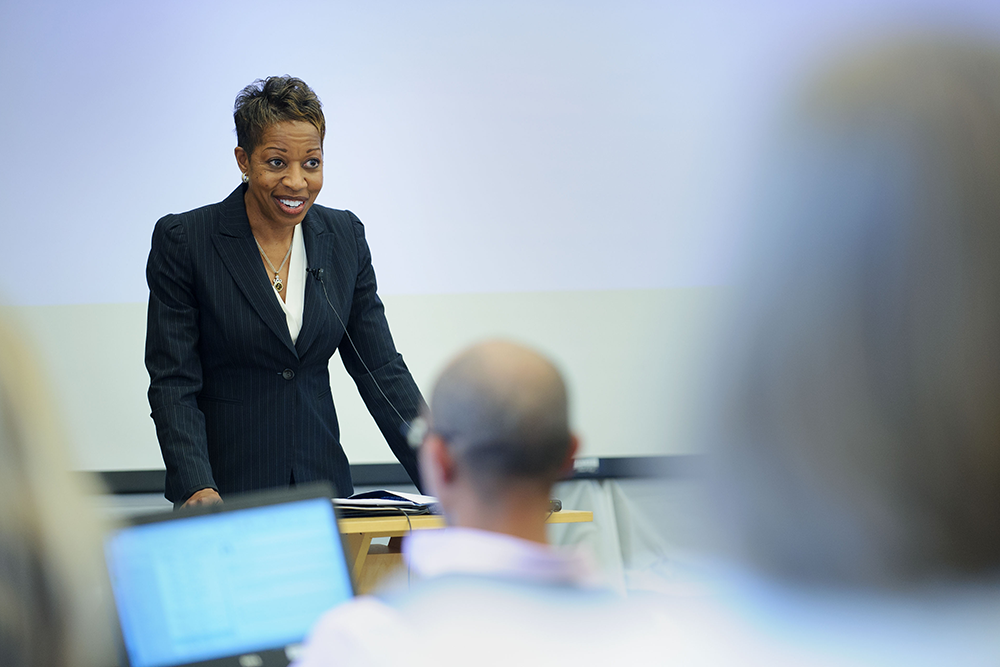Valerie Ashby Addresses Arts & Sciences Faculty: 'Being Better But With Humility'

Duke isn’t the same university it was when Trinity College Dean Valerie Ashby arrived three years ago. The school is changing, moving forward in the right direction on its key mission of research, teaching and service, she told Arts & Sciences faculty Thursday.
But there is more work to be done, and the key to keep moving forward, she said, is focusing on faculty excellence, developing new tools for leadership and mentorship and embracing Duke’s growing diversity. Those three goals are interrelated, she said, and “we can’t do any of these without the others.”
Part of the talk was a review of accomplishments, a reminder, Ashby said, that Duke doesn’t need to compare itself to other educational institutions.
“I got here and found that Duke was just trying to be Duke, and that’s great enough,” she said. “A Duke education is highly interactive engagement between faculty and students, which is a rare and beautiful thing in higher education.
“We leverage all of our advantages in special ways. With all (other) nine schools on one campus, I can walk to every other dean’s office, which is something few universities can boast of and which lowers the barriers to collaboration. In short, we must try to be better than everyone else, but with some humility.”
She noted how Duke’s rise in excellence has been accompanied and promoted by a significant change in faculty and student demographics, although she cautioned against complacency. She added that a more diverse student population is both a boon to Duke education but also a challenge.
“The question is, are we as faculty ready to teach this breadth of students? Are we ready for this diversity? If you think you’re ready, you’re probably not. Nobody is as ready as you think they are.”
Ashby cited the Teaching for Equity program, now in its third year, which has trained more than three dozen faculty members in creating a classroom culture that benefits learning and all students.
“The name could turn you off, but let me describe it,” Ashby said. “It’s simply meant to maximize faculty engagement with students in classrooms. It’s about good teaching.”
To support advances in research, Ashby pledged to “recruit and retain game changers as new faculty. We want new faculty who come here because they’re excited about doing teaching and research in service and doing all this in collaboration. Faculty come here because they want to be with the great faculty we already have here. It’s tremendous what our colleagues have already accomplished.”
Ashby also referenced the new strategic plan “Together Duke,” which will help shape school priorities. The plan noted the continued university strengths in the humanities and progress in social sciences, but emphasized that “we must now invest more in the sciences or Duke’s national and international standing will be at risk,” Ashby said.
“The plan for investment is still being mapped out,” she added. “But I want everyone to know that while our eye will be on the sciences, we not allow our leadership in the humanities and social sciences to slip any.”
Ashby also encouraged faculty to engage in leadership roles, whether it is through university service or informally as mentors to other faculty members. She said she understood the significant demands on faculty members’ time, and she said she is excited about the arrival of Abbas Benmamoun, the new vice provost for faculty advancement.
However, Ashby added that she didn’t want 20 percent of the faculty doing 80 percent of the service work, emphasizing how important collegial mentorship is to the success and cultivation of talented young faculty members.
Following Ashby’s talk, the council discussed next steps in the review of the undergraduate curriculum, which was put on hold at the end of the past academic year because of a lack of faculty consensus.
Council chair Professor Anita Layton said the council would not formally resume the curriculum review this year, but “that doesn’t mean we’re going to sit on our hands.” Instead, council leaders will collect ideas and comments from faculty in a variety of ways, from town hall meetings to small group discussions and individual submissions. There will be “no timetable, pressure or rush,” she said.
The hope is, that combined with information gathered during the three years of the previous curriculum review, faculty will find a new avenue to consensus.